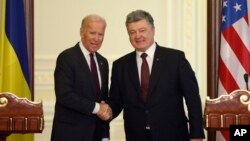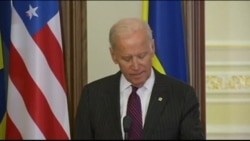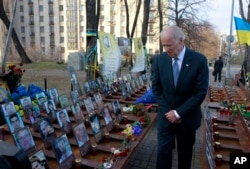U.S. Vice President Joe Biden says "the international community" must stand up against Russian aggression and urged President-elect Donald Trump to be a strong supporter and partner of Ukraine.
Speaking Monday in Kyiv alongside President Petro Poroshenko, Biden noted Ukraine is “fighting both the cancer of corruption” and “the unrelenting aggression of the Kremlin."
Comments by Trump in a joint interview with The Times of London and Germany's Bild newspaper suggested he is looking to cut a deal with Russia, ending sanctions on Moscow in exchange for an agreement on cutting nuclear weapons.
Biden said sanctions against Moscow imposed in the aftermath of Russia's 2014 annexation of Crimea should continue.
"The Crimea-related sanctions against Russia must remain in place until Russia returns full control to the people of Ukraine," he said.
Biden said other sanctions related to Russia's involvement in the separatist war in eastern Ukraine should remain in place until Russia fulfills its obligations under the 2015 Minsk agreement on ending that conflict.
WATCH: U.S. Vice president Biden on Ukraine
Last official trip
This was Biden’s last official visit to Kyiv as vice president, during which he reflected the special focus Ukraine has received under the outgoing Obama administration.
During his one-day visit, Biden also met with Prime Minister Volodymyr Groysman. The White House said Biden hailed the "remarkable cooperation" between the United States and Ukraine and the "consistent bipartisan support in the United States for Ukraine's progress."
Biden has been the front man for U.S. policy towards Ukraine, visiting the country five times since the 2013-2014 uprising that ousted the pro-Russian government, and he has kept regular telephone contact with Ukrainian officials.
The U.S. support for Ukraine, which has included the economic sanctions against Russia linked to the annexation of Crimea and a separatist conflict in eastern Ukraine, has contributed to a deterioration in U.S.-Russian relations to their worst since the Cold War.








